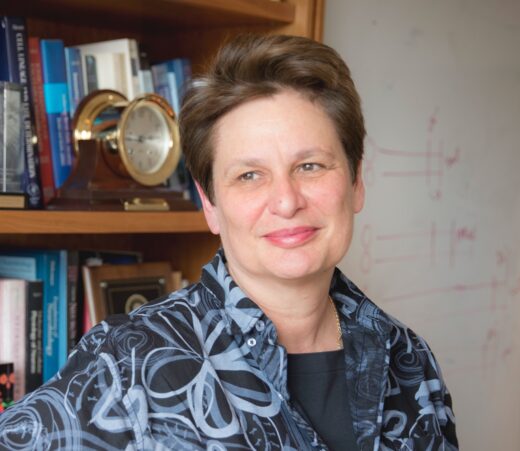
On Thursday 3rd November at 11AM (GMT), Catherine Dulac will deliver the 2022 Francis Crick Lecture in the LMB’s Max Perutz Lecture Theatre and over Zoom. Catherine’s talk, ‘Neurobiology of Social and Sickness Behaviors’ is free and open to all who are interested.
Catherine Dulac is the Higgins Professor of Molecular and Cellular Biology, the Lee and Ezpeleta Professor of Arts and Sciences, and a Howard Hughes Medical Institute Investigator at Harvard University. Her research seeks to improve understanding of how the brain controls instinctive behaviours. Using molecular, genetic and optical techniques, her group have investigated the molecular and neuronal basis of innate social behaviours in mice, including the circuits behind sex-specific behaviours and parental behaviours. Catherine’s research into these topics was awarded the 2021 Breakthrough Prize in Life Sciences.
Recently, Catherine has published research explaining sickness-associated behaviours; identifying a population of neurons within the ventral medial preoptic area (VMPO) of the hypothalamus which activate in response to the introduction of sickness. These neurons generate symptoms associated with sickness such as fever, warmth-seeking, loss of appetite and fatigue. Looking ahead, further exploration of this research, could allow scientists to reverse the onset of these symptoms when they impede recovery or present for a sustained period, for example in chemotherapy patients struggling with low appetite.
Catherine grew up in Montpellier, France and received her PhD in Developmental Biology from the University of Paris where she studied in Nicole Le Douarin’s laboratory. She took a postdoctoral position with Richard Axel at Columbia University in 1992 before starting her own research group at Harvard University.
Lecture abstract
Social interactions are essential for animals to survive, reproduce and raise their young. Over the years, my lab has attempted to decipher the unique characteristics of social recognition: what are the unique cues that trigger distinct social behaviours, what is the nature and identity of social behaviour circuits, how is the function of these circuits different in males and females and how are they modulated by the animal physiological status? In this lecture, I will describe our recent progress in understanding how the brain participates in the positive and negative control of adult-adult social interactions, providing a new framework to understand the regulation of social behaviours in health and disease. Finally, I will describe our recent work uncovering how specific brain circuits are able to direct adaptive changes in behaviour during sickness episodes in mice.
Background information
The Francis Crick lecture is given in honour of LMB alumnus and Nobel Laureate Francis Crick. It is one of a series of named lectures organised by the LMB and given by eminent scientists from around the world.
Francis was born in 1916 in Northampton. He received a BSc in physics from University College London in 1937. His subsequent PhD was interrupted by World War II, during which he worked on the design of acoustic and magnetic mines for the British Admiralty. In 1948 he joined Max Perutz’s MRC Unit for Research on the Molecular Structure of Biological Systems (now the MRC Laboratory of Molecular Biology). It was here that he helped solve the structure of DNA and initiated work on the genetic code. In 1976 he moved to the Salk Institute in California where he immersed himself in trying to define how we are aware of things, looking to find a neuronal correlate of consciousness. He continued with this until he died in San Diego on 28 July 2004.
Further references
2022 Crick Lecture Zoom link
Catherine Dulac
Francis Crick LMB Alumni Biography
LMB Named Lectures
Poster for the Lecture